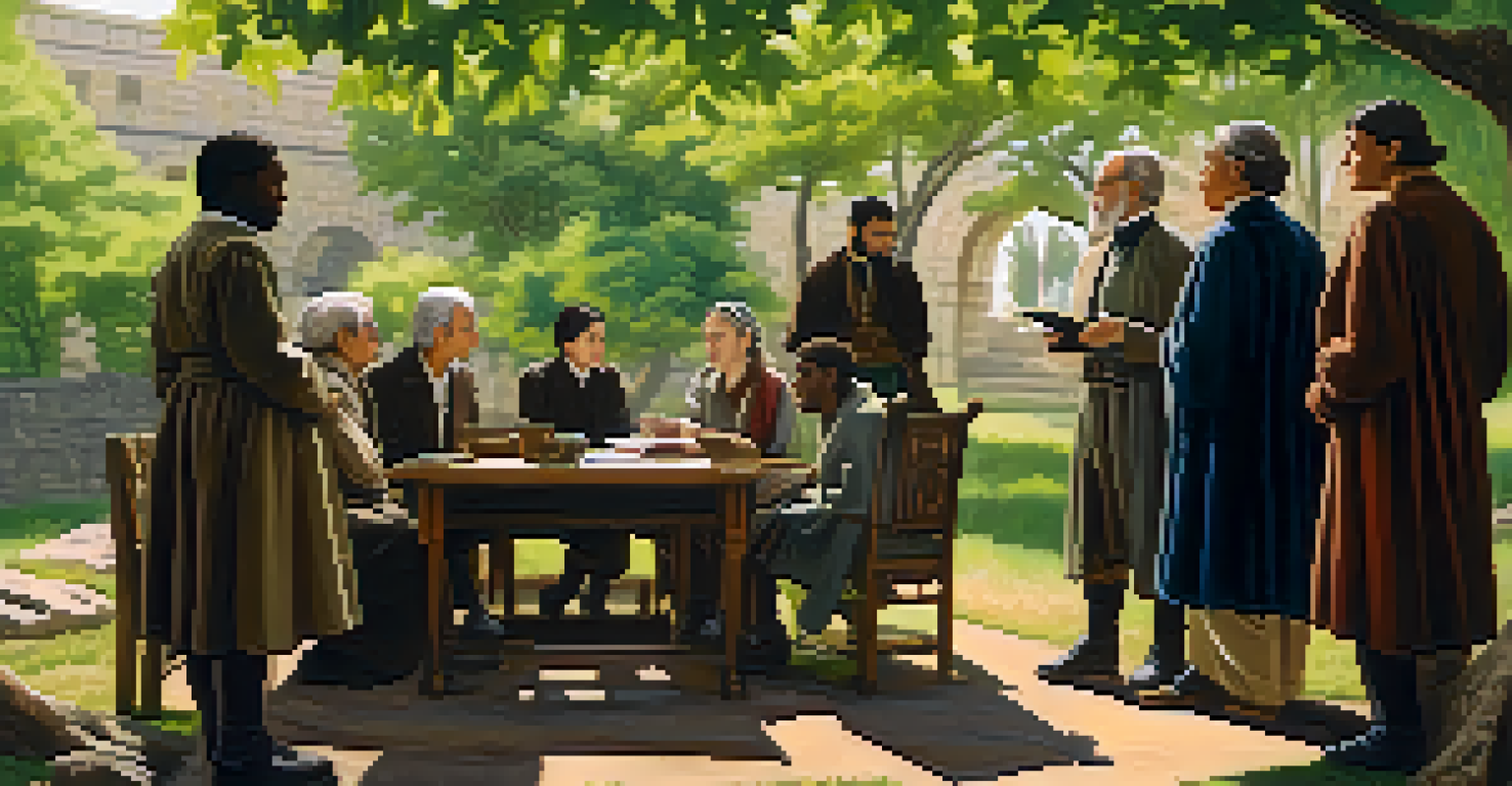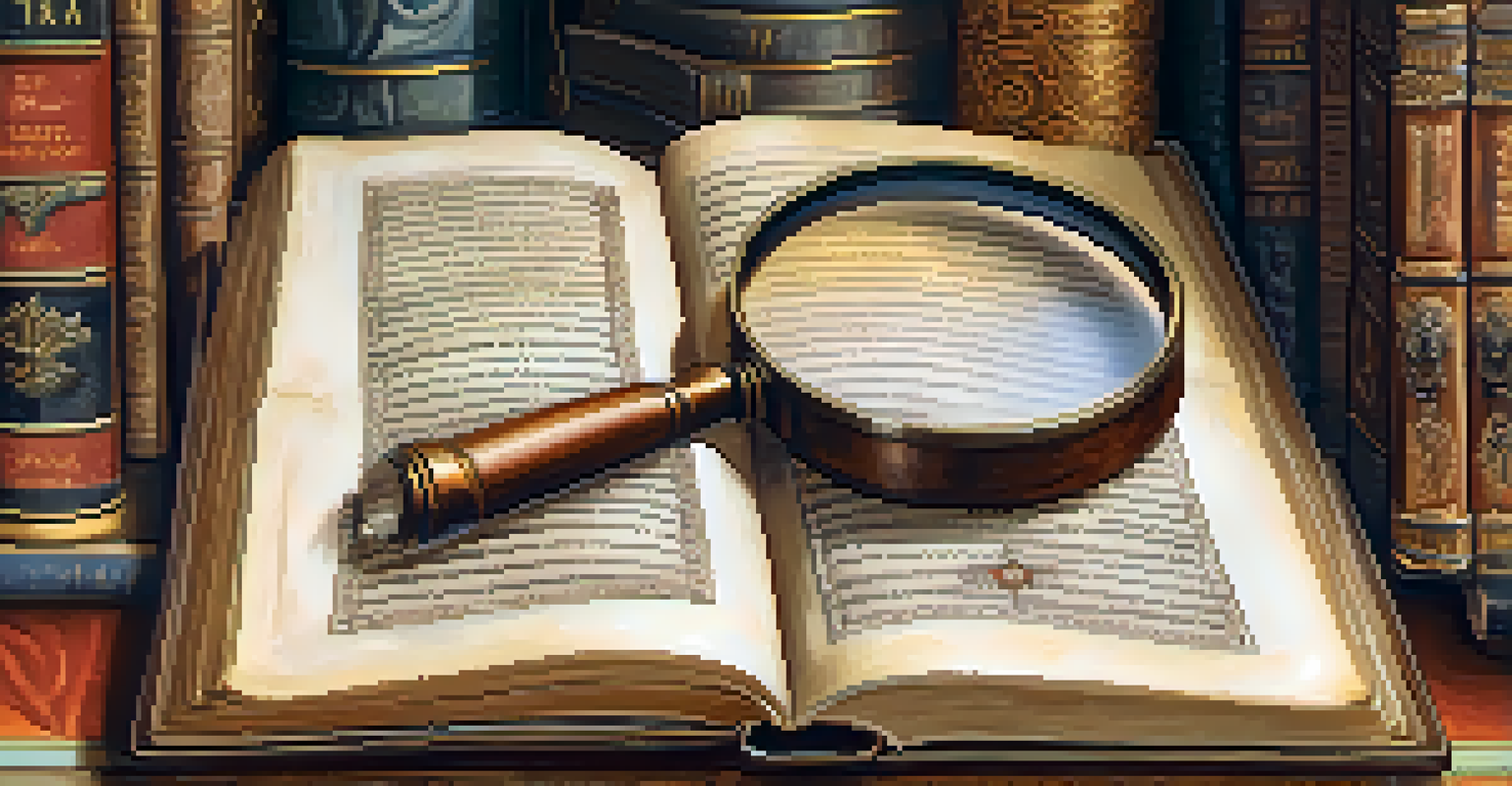The Ethics of Historical Writing: Challenges and Solutions

Understanding the Importance of Ethics in Historical Writing
Ethics in historical writing is crucial because it shapes our understanding of the past. Historians wield significant power in interpreting events, and their choices can influence public perception. The responsibility that comes with this power demands a strong ethical framework to guide decisions about what to include or exclude in their narratives.
The past is never dead. It's not even past.
When historians present their work, they must consider the impact of their interpretations on communities and cultures. For instance, presenting a biased viewpoint can perpetuate stereotypes and historical injustices. This calls for a careful balance between personal interpretation and factual representation, ensuring that multiple perspectives are acknowledged.
Moreover, ethical historical writing fosters trust between historians and their audience. Readers expect accuracy and fairness, so when historians maintain high ethical standards, it enhances the credibility of their work. Ultimately, understanding and embracing ethical considerations are essential for responsible historical scholarship.
Challenges Historians Face in Ethical Writing
One significant challenge historians encounter is the availability and reliability of sources. Many historical documents are incomplete, biased, or lost to time, making it difficult to form a comprehensive narrative. Historians must navigate these limitations while striving to present a truthful account of events, which can often lead to ethical dilemmas.

Another challenge is the risk of presentism, where current values and perspectives unduly influence interpretations of historical events. For example, judging past figures by modern standards can distort their actions and intentions. Historians must tread carefully to avoid projecting contemporary ideologies onto historical contexts.
Ethics Shape Historical Understanding
A strong ethical framework is essential for historians to accurately interpret the past and influence public perception.
Additionally, there is the challenge of representing marginalized voices. Often, traditional historical narratives have sidelined certain groups, leading to an incomplete understanding of history. Historians face the ethical responsibility of amplifying these voices while being mindful of the complexities involved in their representation.
The Role of Bias in Historical Narratives
Bias is an inherent part of historical writing, as every historian has their own perspective shaped by personal experiences and societal influences. This can be both a strength and a weakness; while individual perspectives can enrich narratives, they also risk skewing the representation of events. Recognizing one's bias is an essential step toward ethical writing.
History is written by the victors.
For instance, two historians might interpret the same event differently based on their cultural backgrounds, leading to varied conclusions. These differing interpretations highlight the importance of transparency in historical writing. By openly discussing their biases, historians can provide readers with context, allowing them to critically engage with the material.
Addressing bias does not mean eliminating personal viewpoints but rather acknowledging and balancing them with objective evidence. This creates a more nuanced understanding of history, as readers gain insights into the complexities of the past and the factors that shape historical interpretation.
Strategies for Ethical Historical Research
To navigate the ethical complexities of historical writing, historians can employ various research strategies. One effective approach is triangulation, which involves using multiple sources to verify information. By cross-referencing different types of evidence—such as primary documents, secondary analysis, and oral histories—historians can build a more accurate and well-rounded narrative.
Additionally, historians should prioritize transparency in their methodology. Clearly outlining how they conducted their research allows readers to understand the basis of their conclusions. This openness fosters trust and encourages critical engagement, as readers can assess the validity of the claims made.
Bias Affects Historical Narratives
Historians' personal biases can enrich or skew narratives, making transparency about these biases vital for ethical writing.
Furthermore, engaging with diverse perspectives is vital for ethical historical writing. Historians should actively seek out voices from various backgrounds to create a richer tapestry of historical narratives. By including these different viewpoints, they can challenge dominant narratives and contribute to a more inclusive understanding of history.
The Importance of Accountability in Historical Writing
Accountability is a cornerstone of ethical historical writing. Historians must hold themselves responsible for the accuracy and integrity of their work. This means being willing to correct errors, acknowledge biases, and engage with criticisms from peers and the public. Such accountability not only enhances the credibility of the historian but also promotes a culture of integrity within the field.
Moreover, historians should be open to feedback from diverse audiences. Engaging with different communities can provide valuable insights that might not have been considered during the research process. This collaborative approach to historical writing helps ensure that various perspectives are represented and that the narratives produced are as accurate as possible.
Ultimately, accountability fosters a sense of trust between historians and the communities they write about. When historians demonstrate a commitment to ethical practices, they not only contribute to scholarly discourse but also serve the public by providing a more truthful account of history.
Navigating the Digital Age: Challenges and Opportunities
The digital age has transformed the landscape of historical writing, presenting both challenges and opportunities. On one hand, the vast array of online resources allows historians to access a wealth of information and engage with a global audience. However, the ease of spreading misinformation poses significant ethical challenges that historians must navigate carefully.
In the digital realm, the line between credible scholarship and unverified content can blur. Historians need to be vigilant in discerning reliable sources from dubious ones, as inaccurate representations can propagate harmful narratives. This requires a commitment to rigorous research practices and clear communication to guide readers toward trustworthy information.
Accountability Builds Trust in History
Historians must be accountable for their work, correcting errors and engaging with diverse audiences to foster trust and integrity.
Additionally, digital platforms provide unique opportunities for collaboration and engagement. Historians can share their work through blogs, podcasts, and social media, reaching wider audiences and fostering discussions. By embracing these tools while adhering to ethical principles, historians can enhance public understanding of history in an increasingly interconnected world.
Future Directions: Building an Ethical Framework for Historians
As we look to the future, developing a robust ethical framework for historical writing is essential. This framework should address the evolving challenges posed by new technologies, diverse perspectives, and the complexities of representing the past. By fostering a culture of ethical reflection, historians can better navigate the moral dilemmas inherent in their work.
One potential avenue for this framework is the establishment of collaborative networks among historians. By sharing best practices and collectively addressing ethical challenges, these networks can create a supportive environment that encourages ethical scholarship. This collaboration can lead to a deeper understanding of the ethical implications of historical writing and promote a shared commitment to integrity.

Ultimately, building an ethical framework requires ongoing dialogue and reflection within the historical community. By prioritizing ethics in their work, historians can contribute to a more nuanced and responsible understanding of the past, ensuring that history serves as a tool for learning and growth rather than division.